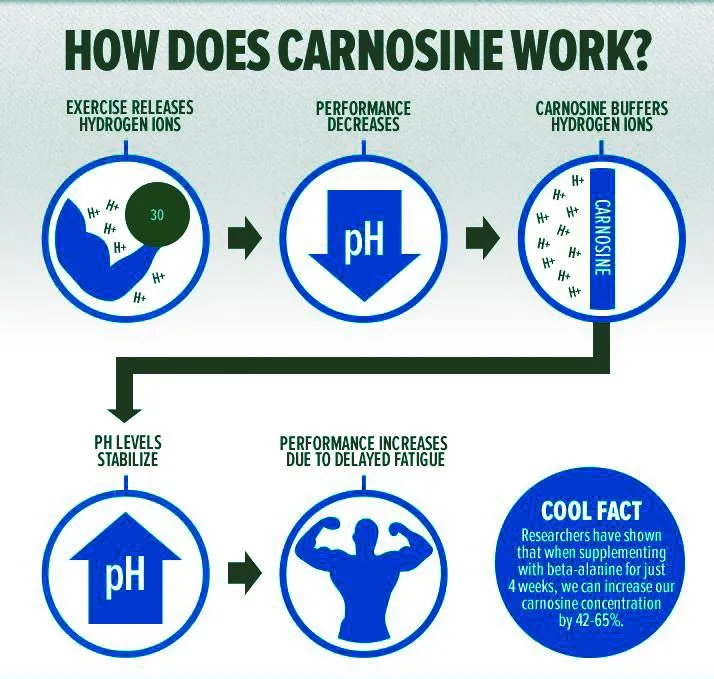Trainer Arizona Fitness Blog

Welcome to Trainer Arizona fitness blog, A divsion of Thurston Personal Training.
Where we're dedicated to providing you with informative and engaging content to support your fitness journey. Whether you're a beginner looking for tips on getting started or a seasoned gym-goer seeking new workout ideas, our fitness articles cover a wide range of topics to help you achieve your goals.
From nutrition advice to workout routines and motivational stories, our personal training blog is your go-to resource for all things fitness. Based in Phoenix, Arizona, our team of experienced personal trainers brings you expert insights and local fitness events to keep you motivated and inspired. Stay tuned for regular updates and join us on the path to a healthier, happier you!

What is Beta-Alanine?
What is beta-alanine?
Beta-alanine, also referred to as 3-aminopropanoic acid, is a non-essential amino acid. It’s found naturally in the body, where it can be synthesized from the breakdown of pyrimidine nucleotides. We can also get beta-alanine from our diets thru carnosine, and to a lesser extent from anserine and balenine.
Carnosine is a dipeptide –- a molecule made of two amino acids bonded together — is composed of beta-alanine and histidine. these dipeptides can be found in meats. (consider the word “carnivore” to help you consider in which to get carnosine.) In the body, carnosine appears to be concentrated in tissues which have a high energy demand, like muscles and the brain.
Why is beta-alanine crucial?
For the duration of exercise (particularly at high intensity), the formation of strength (ATP) leads to an increase in hydrogen (H+) ions. This increase in H+ ions is mostly due to lactic acid formation, which lowers the body’s pH (i.e. growing a more acidic environment). Because the acidity rises, it’s tougher to contract the muscle, and fatigue can result. Consequently, if the body can buffer the acidity, it could delay muscle fatigue.
The body’s first line of defense towards this acidic pH is in the muscle cell is carnosine. Carnosine is able to buffer H+ ions in muscle cells. This buffering can neutralize lactic acid and simultaneously boom ATP stores.
Carnosine additionally acts as an anti-glycation agent and antioxidant. Furthermore, carnosine appears to assist the enzymes crucial for muscle contraction.
Because carnosine is so crucial, beta-alanine is also critical. without enough beta-alanine the body can’t make carnosine successfully, which means that that these crucial cell capabilities are impeded. Since most of the people normally have sufficient histidine (the opposite part of carnosine), and on account that ingesting histidine with the aid of itself appears to have little to no impact on cellular carnosine concentrations, the limiting factor in carnosine synthesis is beta-alanine.
Benefits of Beta-Alanine backed up by Scientific Studies
Improves explosive muscular strength and power output.
Increases muscle mass.
Enhances muscular anaerobic endurance.
Boosts aerobic endurance.
Improves exercise capacity so you can train harder and longer.
What you have to know
Beta-alanine can enter a muscle cell and increase carnosine concentrations. If we increase carnosine levels in cells via beta-alanine supplementation, we are able to optimize intracellular buffering and reduce acid accumulation throughout exercising. Consequently, during high intensity exercise that causes vast changes in pH and high quantities of lactate in the blood, beta-alanine may additionally improve performance and therefore result in better results. Along with buffering lactic acid, beta-alanine supplementation may additionally help with healing, muscle recovery, and muscle contraction.
So if the main reason for beta-alanine supplementation is to elevate muscle carnosine concentrations, why not simply take carnosine? Unfortunately, carnosine doesn’t have good oral bioavailability. When consumed, it will simply be broken down into its respective amino acids (beta-alanine and histidine). Although once amino acids enter the muscle cells, they may be able to form carnosine again. But because the body has enough histidine stores, it is much more efficient to just supplement with beta alanine. In summary, beta-alanine supplementation can help to delay fatigue, boost anaerobic threshold, increase strength, improve power output, and enhance muscle hypertrophy.
